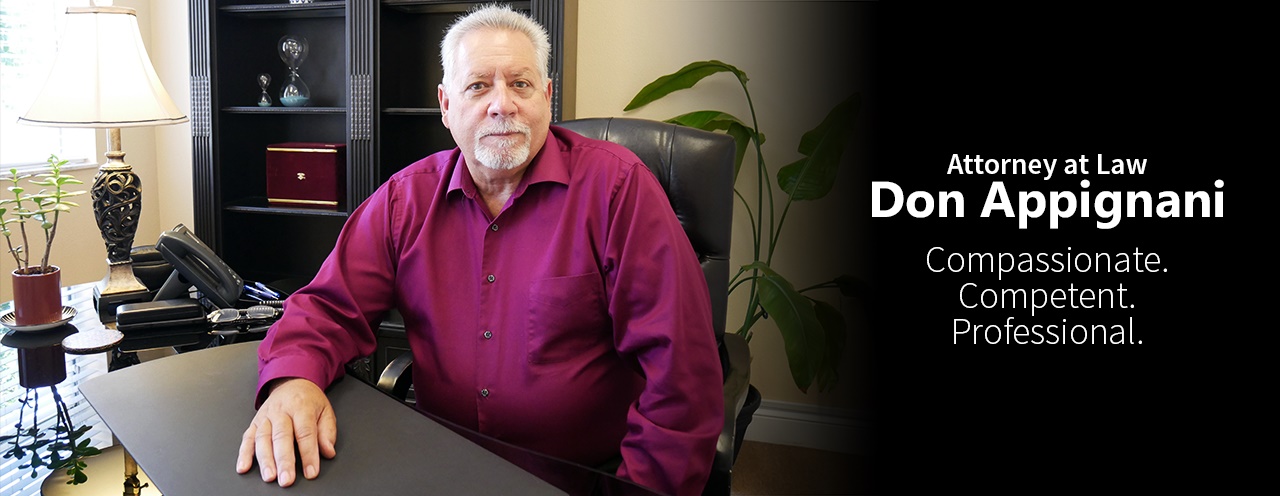Donald Appignani
Wills, Estate Planning, Probate
Probate generally is a court-supervised process for identifying and gathering the decedent's assets, paying taxes, claims and expenses of administration, and distributing assets to beneficiaries. The Florida Probate Code is found in Chapters 731 through 735 of the Florida Statutes.
WHY IS PROBATE NECESSARY?Probate is necessary to pass ownership of the decedent's probate assets to the decedent's beneficiaries. If the decedent left a valid will, unless the will is admitted to probate in the Court, it will be ineffective to pass title to the decedent's beneficiaries. If the decedent had no will, probate is necessary to pass ownership to the decedent's assets to those persons who are to receive them under Florida law.
Probate is also necessary to wind up the decedent's financial affairs after his or her death. Administration of the decedent's estate ensures that the decedent's creditors are paid if certain procedures are correctly followed.
WHAT IS A WILL?A will is a writing, signed by the decedent and witnesses, that meets the requirements of Florida law. In his or her will, the decedent can name the beneficiaries whom the decedent wants to receive the decedent's probate assets. The decedent can also designate a personal representative (Florida's term for an executor) of his or her choosing to administer the estate.
If the decedent's will disposes of all of the decedent's probate assets and designates a personal representative, the will controls over the default provisions of Florida law. If the decedent did not have a valid will, or if the will fails in some respect, the identities of the persons who will receive the decedent's probate assets, and who will be selected as the personal representative of the decedent's probate estate, will be as provided by Florida law.
WHAT CAN BE ACCOMPLISHED BY A WILL?- You decide who gets your property instead of the law making the choice for you.
- You may name the personal representative (executor) of your will as you choose, provided the one named can qualify under Florida law. A personal representative is one who manages an estate, and may be either an individual or a bank or trust company, subject to certain limitations.
- A trust may be created in a will whereby the estate or a portion of the estate will be kept intact with income distributed or accumulated for the benefit of members of the family or others. Minors can be cared for without the expense of proceedings for guardianship of property.
- Real estate and other assets may be sold without court proceedings, if your will adequately authorizes it.
- You may make gifts, effective at or after your death, to charity.
- You decide who bears any tax burden, rather than the law making that decision.
- A guardian may be named for minor children.
 WHAT HAPPENS WHEN THERE IS NO WILL?
WHAT HAPPENS WHEN THERE IS NO WILL?
If you die without a will (this is called dying "intestate"), your property will be distributed to your heirs according to a formula fixed by law. Your property does not go to the State of Florida unless there are absolutely no heirs at law, which is very unlikely. In other words, if you fail to make a will, the inheritance statute determines who gets your property. The inheritance statute contains a rigid formula and makes no exception for those in unusual need.
When there is no will, the court appoints a personal representative, known or unknown to you, to manage your estate. The cost of probating may be greater than if you had planned your estate with a will, and the administration of your estate may be subject to greater court supervision.
DOES A WILL INCREASE PROBATE EXPENSES?No, it does not. If there is property to be administered or taxes to be paid or both, the existence of a will does not increase probate expenses. A will frequently reduces expenses. If there is real or personal property to be transferred at your death, the probate court will have jurisdiction to ensure that it is transferred properly, either according to your will, or, if there is no will, in accordance with the inheritance statute. Thus, even if you have no will, your heirs must go to court to administer your estate, obtain an order determining your legal heirs, or obtain a determination that administration is unnecessary. These procedures are often more expensive than administering your will, since a properly drawn will names the beneficiaries and delineates procedures to simplify the administration process.
WHO SHOULD PREPARE A WILL?No sensible person would employ "just anyone" to fill teeth, take out an appendix, or deliver a baby. The person who wants these services performed skillfully with the minimum risk to health, life, property, or the accurate execution of his or her wishes, will engage the services of a trained person. Except in dire emergency, these important tasks should not be performed by anyone except the professional.
The drafting of a will involves making decisions that require professional judgment which can be obtained only by years of training, experience, and study. Only the practicing lawyer can avoid the innumerable pitfalls and advise the course best suited for each individual situation. In addition, an experienced attorney will be able to coordinate the use of other skilled professionals, such as an investment advisor, actuary, insurance specialist, and tax accountant to complete a proper estate plan.
Moreover, there is no such thing as a "simple will." Even smaller estates can have complexities only foreseeable by the experienced attorney.
GUARDIANSHIP:A guardianship is a legal proceeding in the circuit courts of Florida in which a guardian is appointed to exercise the legal rights of an incapacitated person.
WHAT IS A GUARDIAN?A guardian is an individual or institution such as a bank trust department appointed by the court to care for an incapacitated person-called a "ward" or for the ward's assets.
HOW IS A PERSON DETERMINED TO BE INCAPACITATED?Any adult may file with the court a petition to determine another person's incapacity setting forth the factual information upon which they base their belief that the person is incapacitated. The court then appoints a committee of two professionals, usually physicians, and a lay person to examine the person and report its findings to the court. The court also appoints an attorney to represent the person alleged to be incapacitated. If the examining committee concludes that the alleged incapacitated person is not incapacitated in any way, the court will dismiss the petition. If the examining committee finds the person to be incapable of exercising certain rights, however, the court schedules a hearing to determine whether the person is totally or partially incapacitated. A guardian is usually appointed at the end of the incapacity hearing.
WHO MAY SERVE AS GUARDIAN?Any adult resident of Florida can serve as a guardian. A close relative of the ward who does not live in Florida may also serve as a guardian. Persons who have been convicted of a felony or who are incapable of carrying out the duties of a guardian cannot be appointed. Institutions such as a bank trust department, a nonprofit religious or charitable corporation, or a public guardian, can be appointed guardian, but a bank trust department may only act as guardian of the property. The court gives consideration to the wishes expressed by the incapacitated person in a written declaration of preneed guardian or at the hearing.
WHAT DOES A GUARDIAN DO?A guardian who is given authority over any property of the ward shall inventory the property, invest it prudently, use it for the ward's support, and account for it by filing detailed annual reports with the court. In addition, the guardian must obtain court approval for certain financial transactions.
The guardian of the ward's person may exercise those rights that have been removed from the ward and delegated to the guardian, such as providing medical, mental and personal care services and determining the place and kind of residential setting best suited for the ward. The guardian of the person must also present to the court every year a detailed plan for the ward's care.
IS A GUARDIAN ACCOUNTABLE?Yes. Guardians must be represented by an attorney who will serve as "attorney of record." Guardians are usually required to furnish a bond and may be required to complete a court-approved training program. The Clerk of the Court reviews all annual reports of guardians of the person and property and presents them to the court for approval. A guardian who does not properly carry out his or her responsibilities may be removed.
IS GUARDIANSHIP PERMANENT?Not necessarily. If a person recovers in whole or part from the condition that caused him or her to be incapacitated, the court will have the ward reexamined and can restore some or all of the person's rights.
IS GUARDIANSHIP THE ONLY MEANS OF HELPING AN INCAPACITATED PERSON?No. Florida law requires the use of less restrictive alternatives to protect persons incapable of caring for themselves and managing their financial affairs whenever possible. If a person creates an advance health care directive and a durable power of attorney or revocable living trust while competent, he or she may not require a guardian in the event of incapacity.
WHAT ABOUT GUARDIANS FOR MINORS?A child's parents are the child's natural guardians and in general may act for the child. In circumstances where the parents die or become incapacitated or if a child receives an inheritance or proceeds of a lawsuit or insurance policy exceeding $15,000, the court must appoint a guardian. Both parents, or a surviving parent, may make and file with the Clerk of the Court a written declaration naming a guardian of the child's person or property to serve if both parents die or become incapacitated. A guardian may also be designated in a will in which the child is a beneficiary.

